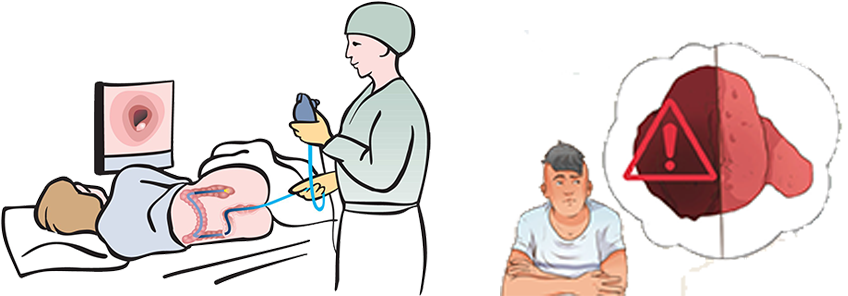Black stools

Black stools can be due to bleeding in gastrointestinal (GI) tract or ingestion of certain medications (iron, bismuth) or certain food (blueberries). Black, tarry, sticky and smelly stool is caused by bleeding in the GI tract, and is known as melena. Malena is a serious medical problem. When the stool becomes dark from bleeding into the gastrointestinal tract, the site of bleeding is usually upper gastrointestinal (GI) tract (esophagus, stomach or upper small intestine). The black color is because of the digestion of the blood by the action of acids in gastric juice. Black stool due to iron or bismuth is side effect of medicine and by itself is harmless.
Common Causes of Malena
- Acute or chronic gastritis (inflammation of the stomach lining).
- Peptic ulcer disease (gastric or duodenal ulcer) – most common causes are Non Steroidal Anti Inflammatory drugs (NSAIDs) like Ibuprofen or Naproxen and Infection with Helicobacter Pylori.
- Bleeding oesophageal varices (dilated veins in food pipe) which occur in patients with Cirrhosis of liver (when healthy liver is replaced by scar tissue).
- Medicines such as aspirin, Clopidogrel and anticoagulants (warfarin) can cause bleeding,
- Bleeding due to foreign body or traumatic injury of GI tract.
- Cancer of GI tract such as of stomach, oesophagus, and small intestine.
- Angiodysplasia (abnormal blood vessels) of GI tract.
Home remedies
- If the stool is black and tarry and you are not taking medication causing black stool, you should seek medical attention as soon as possible.
- Avoid medicines like Ibuprofen or Naproxen.
- If you are prescribed blood thinners like Aspirin, Clopidogrel or Warfarin inform your physician immediately.
When to visit the doctor?
- Notify the physician if there is a persistent change in the color of the stool.
- Persistent black, tarry stools or red bloody stools indicate intestinal bleeding which needs to be assessed by the physician as soon as possible.
- Do not ignore black or tarry stools. Consult the doctor immediately to establish a cause and begin treatment as early as possible.
Treatment options
Treatment of black stools depends on the cause. Diagnosis of malena and its cause is identified by history and physical examination, and investigations such as blood tests and endoscopic examination. The following treatment options may be considered:
- Malena is initially managed with intravenous fluid, and in severe cases blood transfusion in needed.
- Endoscopy is used to diagnose cause of GI bleeding and treatment of esophageal varices and bleeding peptic ulcers.
- Medicines such as Pantoprazole, Omeprazole (Proton Pump inhibitors) are used to treat peptic ulcers.
- Helicobacter pylori infection is treated with antibiotics.
- Removal of the foreign body from gastrointestinal tract with endoscopy.
- Treatment of cancers with surgery, chemotherapy and other appropriate treatment.



Send us your feedback on this article